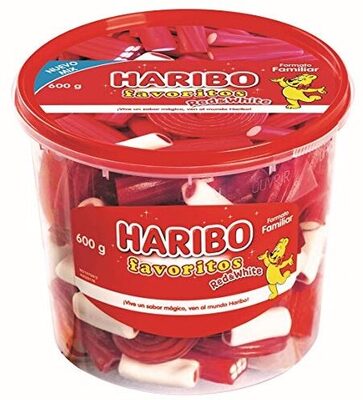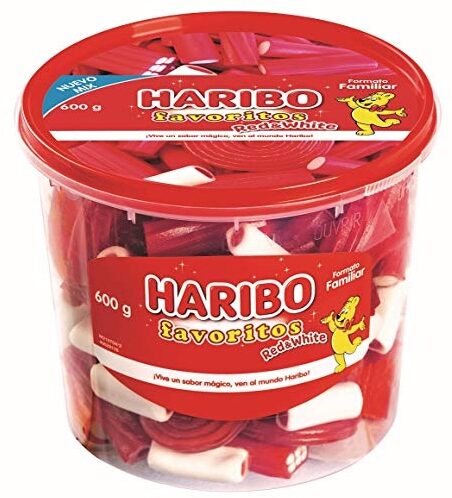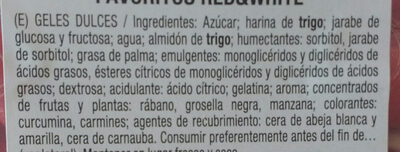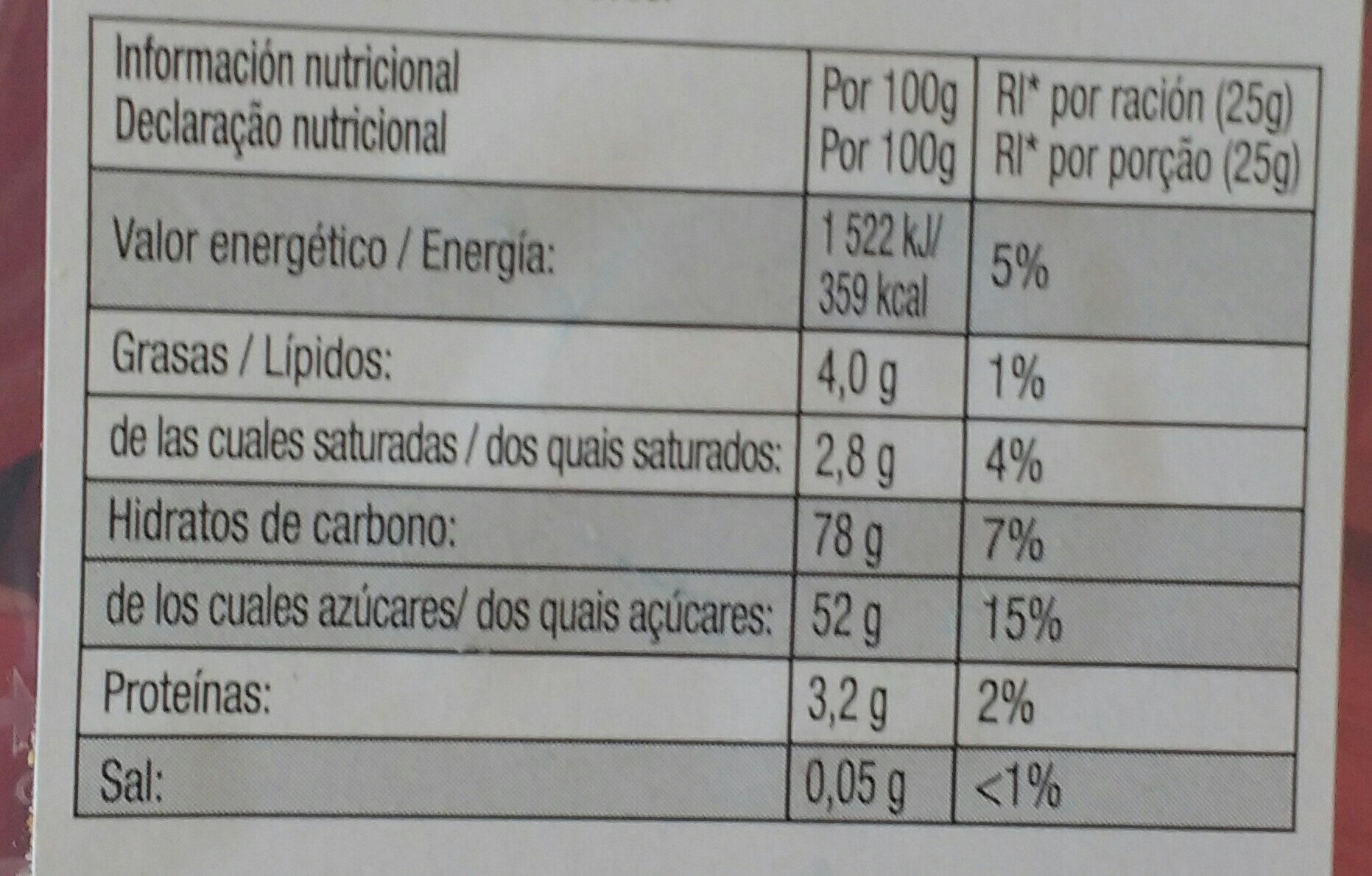Ajuda'ns a fer que la transparència alimentària sigui la norma!
Com a organització sense ànim de lucre, depenem de les vostres donacions per continuar informant els consumidors de tot el món sobre tot allò què mengen.
La revolució alimentària comença amb tu!
Favoritos Red & White - Haribo - 1 kg
Favoritos Red & White - Haribo - 1 kg
Aquesta pàgina del producte no està completa. Podeu ajudar a completar-la editant-la i afegint-hi més dades a partir de les fotos ja disponibles, o fent-ne més amb l'aplicació de androide o iPhone / iPad. Gràcies!
×
Codi de barres: 8426617008529 (EAN / EAN-13)
Quantitat: 1 kg
Marques: Haribo
Categories: Snacks, Aperitius dolços, Llaminadures, Caramels
Etiquetes, certificacions, premis:
Punt verd
Països on es va vendre: Espanya
Matching with your preferences
Salut
Ingredients
-
29 ingredients
: Azúcar; harina de trigo, jarabe de glucosa, fructosa, agua, almidón de trigo, humectantes: sorbitol, jarabe de sorbitol; grasa de palma; emulgentes: monoglicéridos y diglicéridos de ácidos grasos, ésteres cítricos de monoglicéridos y diglicéridos de ácidos grasos; dextrosa; acidulante: ácido cítrico; gelatina; aroma; concentrados de frutas y plantas: rábano, grosella negra, manzana; colorantes: curcumina, carmines; agentes de recubrimiento: cera de abeja blanca y amarilla, cera de carnauba.Al·lèrgens: en:Gluten
Processament d'aliments
-
Aliments ultra processats
Elements que indiquen que el producte està al grup 4 - Aliments i begudes ultraprocessats:
- Additiu: E100 - Curcumina
- Additiu: E120 - Carmí
- Additiu: E420 - Sorbitol
- Additiu: E428 - Gelatina
- Additiu: E471 - Monoglicèrids i diglicèrids d'àcids grassos
- Additiu: E472c - Èsters cítrics dels monoglicèrids i diglicèrids d'àcids grassos
- Additiu: E901 - Cera d'abelles
- Additiu: E903 - Cera de carnauba
- Ingredient: Color
- Ingredient: Dextrosa
- Ingredient: Emulsionant
- Ingredient: Aromes
- Ingredient: Agent de recobriment
- Ingredient: Glucosa
- Ingredient: Xarop de glucosa
- Ingredient: Humectant
Els productes alimentaris es classifiquen en 4 grups segons el seu grau de processament:
- Aliments no processats o mínimament processats
- Ingredients culinaris processats
- Aliments processats
- Aliments ultra processats
La determinació del grup es fa en funció de la categoria del producte i dels ingredients que conté.
Additius
-
E120 - Carmí
Carminic acid: Carminic acid -C22H20O13- is a red glucosidal hydroxyanthrapurin that occurs naturally in some scale insects, such as the cochineal, Armenian cochineal, and Polish cochineal. The insects produce the acid as a deterrent to predators. An aluminum salt of carminic acid is the coloring agent in carmine. Synonyms are C.I. 75470 and C.I. Natural Red 4. The chemical structure of carminic acid consists of a core anthraquinone structure linked to a glucose sugar unit. Carminic acid was first synthesized in the laboratory by organic chemists in 1991.Origen: Wikipedia (Anglès)
-
E330 - Acid citric
Citric acid: Citric acid is a weak organic acid that has the chemical formula C6H8O7. It occurs naturally in citrus fruits. In biochemistry, it is an intermediate in the citric acid cycle, which occurs in the metabolism of all aerobic organisms. More than a million tons of citric acid are manufactured every year. It is used widely as an acidifier, as a flavoring and chelating agent.A citrate is a derivative of citric acid; that is, the salts, esters, and the polyatomic anion found in solution. An example of the former, a salt is trisodium citrate; an ester is triethyl citrate. When part of a salt, the formula of the citrate ion is written as C6H5O3−7 or C3H5O-COO-3−3.Origen: Wikipedia (Anglès)
-
E420 - Sorbitol
Sorbitol: Sorbitol --, less commonly known as glucitol --, is a sugar alcohol with a sweet taste which the human body metabolizes slowly. It can be obtained by reduction of glucose, which changes the aldehyde group to a hydroxyl group. Most sorbitol is made from corn syrup, but it is also found in nature, for example in apples, pears, peaches, and prunes. It is converted to fructose by sorbitol-6-phosphate 2-dehydrogenase. Sorbitol is an isomer of mannitol, another sugar alcohol; the two differ only in the orientation of the hydroxyl group on carbon 2. While similar, the two sugar alcohols have very different sources in nature, melting points, and uses.Origen: Wikipedia (Anglès)
-
E420ii
Sorbitol: Sorbitol --, less commonly known as glucitol --, is a sugar alcohol with a sweet taste which the human body metabolizes slowly. It can be obtained by reduction of glucose, which changes the aldehyde group to a hydroxyl group. Most sorbitol is made from corn syrup, but it is also found in nature, for example in apples, pears, peaches, and prunes. It is converted to fructose by sorbitol-6-phosphate 2-dehydrogenase. Sorbitol is an isomer of mannitol, another sugar alcohol; the two differ only in the orientation of the hydroxyl group on carbon 2. While similar, the two sugar alcohols have very different sources in nature, melting points, and uses.Origen: Wikipedia (Anglès)
-
E471 - Monoglicèrids i diglicèrids d'àcids grassos
Mono- and diglycerides of fatty acids: Mono- and diglycerides of fatty acids -E471- refers to a food additive composed of diglycerides and monoglycerides which is used as an emulsifier. This mixture is also sometimes referred to as partial glycerides.Origen: Wikipedia (Anglès)
-
E901 - Cera d'abelles
Beeswax: Beeswax -cera alba- is a natural wax produced by honey bees of the genus Apis. The wax is formed into "scales" by eight wax-producing glands in the abdominal segments of worker bees, which discard it in or at the hive. The hive workers collect and use it to form cells for honey storage and larval and pupal protection within the beehive. Chemically, beeswax consists mainly of esters of fatty acids and various long-chain alcohols. Beeswax has long-standing applications in human food and flavoring. For example, it is used as a glazing agent or as a light/heat source. It is edible, in the sense of having similar negligible toxicity to plant waxes, and is approved for food use in most countries and the European Union under the E number E901. However, the wax monoesters in beeswax are poorly hydrolysed in the guts of humans and other mammals, so they have insignificant nutritional value. Some birds, such as honeyguides, can digest beeswax. Beeswax is the main diet of wax moth larvae.Origen: Wikipedia (Anglès)
-
E903 - Cera de carnauba
Carnauba wax: Carnauba -; Portuguese: carnaúba [kaʁnɐˈubɐ]-, also called Brazil wax and palm wax, is a wax of the leaves of the palm Copernicia prunifera -Synonym: Copernicia cerifera-, a plant native to and grown only in the northeastern Brazilian states of Piauí, Ceará, Maranhão, Bahia, and Rio Grande do Norte. It is known as "queen of waxes" and in its pure state, usually comes in the form of hard yellow-brown flakes. It is obtained from the leaves of the carnauba palm by collecting and drying them, beating them to loosen the wax, then refining and bleaching the wax.Origen: Wikipedia (Anglès)
Anàlisi dels ingredients
-
Oli de palma
Ingredients que contenen oli de palma: Greix de palma
-
No és vegà
Ingredients no vegans: E428, E120, E901
-
No és vegetarià
Ingredients no vegetarians: E428, E120
-
Detalls de l'anàlisi dels ingredients
: Azúcar, harina de trigo, jarabe de glucosa, fructosa, agua, almidón de trigo, humectantes (sorbitol), jarabe de sorbitol, grasa de palma, emulgentes (monoglicéridos y diglicéridos de ácidos grasos), ésteres cítricos de monoglicéridos y diglicéridos de ácidos grasos, dextrosa, acidulante (ácido cítrico), gelatina, aroma, concentrados de frutas, plantas (rábano), grosella negra, manzana, colorantes (curcumina), carmines, agentes de recubrimiento (cera de abeja blanca y amarilla), cera de carnauba- Azúcar -> en:sugar - vegan: yes - vegetarian: yes - ciqual_proxy_food_code: 31016 - percent_min: 4.34782608695652 - percent_max: 100
- harina de trigo -> en:wheat-flour - vegan: yes - vegetarian: yes - ciqual_proxy_food_code: 9410 - percent_min: 0 - percent_max: 50
- jarabe de glucosa -> en:glucose-syrup - vegan: yes - vegetarian: yes - ciqual_proxy_food_code: 31016 - percent_min: 0 - percent_max: 33.3333333333333
- fructosa -> en:fructose - vegan: yes - vegetarian: yes - ciqual_food_code: 31077 - percent_min: 0 - percent_max: 25
- agua -> en:water - vegan: yes - vegetarian: yes - ciqual_food_code: 18066 - percent_min: 0 - percent_max: 20
- almidón de trigo -> en:wheat-starch - vegan: yes - vegetarian: yes - ciqual_proxy_food_code: 9510 - percent_min: 0 - percent_max: 16.6666666666667
- humectantes -> en:humectant - percent_min: 0 - percent_max: 14.2857142857143
- sorbitol -> en:e420 - vegan: yes - vegetarian: yes - percent_min: 0 - percent_max: 14.2857142857143
- jarabe de sorbitol -> en:e420ii - vegan: yes - vegetarian: yes - percent_min: 0 - percent_max: 12.5
- grasa de palma -> en:palm-fat - vegan: yes - vegetarian: yes - from_palm_oil: yes - ciqual_proxy_food_code: 16129 - percent_min: 0 - percent_max: 11.1111111111111
- emulgentes -> en:emulsifier - percent_min: 0 - percent_max: 10
- monoglicéridos y diglicéridos de ácidos grasos -> en:e471 - vegan: maybe - vegetarian: maybe - from_palm_oil: maybe - percent_min: 0 - percent_max: 10
- ésteres cítricos de monoglicéridos y diglicéridos de ácidos grasos -> en:e472c - vegan: maybe - vegetarian: maybe - from_palm_oil: maybe - percent_min: 0 - percent_max: 9.09090909090909
- dextrosa -> en:dextrose - vegan: yes - vegetarian: yes - ciqual_proxy_food_code: 31016 - percent_min: 0 - percent_max: 8.33333333333333
- acidulante -> en:acid - percent_min: 0 - percent_max: 7.69230769230769
- ácido cítrico -> en:e330 - vegan: yes - vegetarian: yes - percent_min: 0 - percent_max: 7.69230769230769
- gelatina -> en:e428 - vegan: no - vegetarian: no - percent_min: 0 - percent_max: 7.14285714285714
- aroma -> en:flavouring - vegan: maybe - vegetarian: maybe - percent_min: 0 - percent_max: 5
- concentrados de frutas -> en:fruit-concentrate - vegan: yes - vegetarian: yes - percent_min: 0 - percent_max: 5
- plantas -> en:plant - vegan: yes - vegetarian: yes - percent_min: 0 - percent_max: 5
- rábano -> en:radish - vegan: yes - vegetarian: yes - ciqual_food_code: 20045 - percent_min: 0 - percent_max: 5
- grosella negra -> en:blackcurrant - vegan: yes - vegetarian: yes - ciqual_food_code: 13007 - percent_min: 0 - percent_max: 5
- manzana -> en:apple - vegan: yes - vegetarian: yes - ciqual_food_code: 13050 - percent_min: 0 - percent_max: 5
- colorantes -> en:colour - percent_min: 0 - percent_max: 5
- curcumina -> en:e100 - vegan: yes - vegetarian: yes - percent_min: 0 - percent_max: 5
- carmines -> en:e120 - vegan: no - vegetarian: no - percent_min: 0 - percent_max: 4.76190476190476
- agentes de recubrimiento -> en:glazing-agent - percent_min: 0 - percent_max: 4.54545454545455
- cera de abeja blanca y amarilla -> en:e901 - vegan: no - vegetarian: yes - percent_min: 0 - percent_max: 4.54545454545455
- cera de carnauba -> en:e903 - vegan: yes - vegetarian: yes - percent_min: 0 - percent_max: 4.34782608695652
Nutrició
-
Poca qualitat nutricional
⚠ ️Atenció: la quantitat de fibra no s'especifica, no es tindrà en compte la seva possible contribució positiva en la qualificació.⚠ ️Atenció: la quantitat de fruita, verdura i fruits secs no s'especifica a l'etiqueta, s'ha fet una estimació a partir de la llista d'ingredients: 0Aquest producte no es considera una beguda per al càlcul de la Nutri-Score.
Punts positius: 0
- Proteïnes: 1 / 5 (valor: 3.2, valor arrodonit: 3.2)
- Fibra: 0 / 5 (valor: 0, valor arrodonit: 0)
- Fruites, verdures, fruits secs i olis de colza/nou/oliva: 0 / 5 (valor: 0.00273663064708529, valor arrodonit: 0)
Punts negatius: 16
- Energia: 4 / 10 (valor: 1477, valor arrodonit: 1477)
- Sucres: 10 / 10 (valor: 50, valor arrodonit: 50)
- Greixos saturats: 2 / 10 (valor: 2.2, valor arrodonit: 2.2)
- Sodi: 0 / 10 (valor: 4, valor arrodonit: 4)
Els punts per proteïnes no es compten perquè els punts negatius són més o iguals a 11.
Puntuació nutricional: (16 - 0)
Nutri-Score:
-
Nivells de nutrients
-
Greix en Quantitat moderada (3%)
Què us cal saber- Un alt consum de greixos, especialment de greixos saturats, pot augmentar el colesterol, que augmenta el risc de patir malalties del cor.
Recomanació: Reduïu el consum de greixos i greixos saturats- Trieu productes amb menys greixos i greixos saturats.
-
Àcid gras saturat en Quantitat moderada (2.2%)
Què us cal saber- Un alt consum de greixos, especialment de greixos saturats, pot augmentar el colesterol, que augmenta el risc de patir malalties del cor.
Recomanació: Reduïu el consum de greixos i greixos saturats- Trieu productes amb menys greixos i greixos saturats.
-
Sucre en alta quantitat (50%)
Què us cal saber- Un alt consum de sucre pot provocar augment de pes i càries dental. També augmenta el risc de patir diabetis tipus 2 i malalties cardiovasculars.
Recomanació: Limitau el consum de sucre i de begudes ensucrades- Les begudes ensucrades (com ara refrescos, begudes de fruites i sucs i nèctars de fruites) s'han de limitar tant com sigui possible (no més d'1 got al dia).
- Triau productes amb menor contingut de sucre i reduïu el consum de productes amb sucres afegits.
-
Sal comuna en baixa quantitat (0.01%)
Què us cal saber- Un alt consum de sal (o sodi) pot provocar un augment de la pressió arterial, que pot augmentar el risc de patir malalties del cor i ictus.
- Moltes persones que tenen hipertensió no ho saben, ja que sovint no en tenen símptomes.
- La majoria de la gent consumeix massa sal (de 9 a 12 grams de mitjana al dia), al voltant del doble del nivell màxim d'ingesta recomanat.
Recomanació: Limitau la ingesta de sal i d'aliments rics en sal- Reduïu la sal que emprau quan cuinau, i no afegiu sal a taula.
- Limiteu el consum d'aperitius salats i trieu productes amb menor contingut de sal.
-
-
Informació nutricional
Informació nutricional Com es ven
per 100 g/100 mlComparat amb: Caramels Energia 1.477 kj
(353 kcal)+3% Greix 3 g +216% Àcid gras saturat 2,2 g +302% Hidrats de carboni 78 g -6% Sucre 50 g -11% Fiber ? Proteïna 3,2 g +53% Sal comuna 0,01 g -92% Fruits‚ vegetables‚ nuts and rapeseed‚ walnut and olive oils (estimate from ingredients list analysis) 0,003 %
Entorn
-
Eco-puntuació D - Impacte ambiental alt
El Eco-Score és una puntuació experimental que resumeix els impactes ambientals dels productes alimentaris.→ L'Eco-Score es va desenvolupar inicialment a França i s'està ampliant per a altres països europeus. La fórmula Eco-Score està subjecta a canvis, ja que es millora periòdicament per fer-la més precisa i més adequada per a cada país.Anàlisi del cicle de vida
-
Impacte mitjà dels productes de la mateixa categoria: B (Score: 62/100)
Categoria: Candies, all types
Categoria: Candies, all types
- Puntuació ambiental PEF ( petjada ambiental de l'aliment ): 0.41 (com més baixa sigui la puntuació, menor serà l'impacte)
- incloent l'impacte sobre el canvi climàtic: 1.73 kg CO₂ eq/kg del producte
Etapa Impacte Agricultura
78.2 %Processament
10.7 %Empaquetament
5.5 %Transport
4.5 %Distribució
1.1 %Consum
0.0 %
Bonificacions i punts negatius
-
Falta informació sobre l'origen dels ingredients
Punts negatius: -5
⚠ ️ L'origen dels ingredients d'aquest producte no està indicat.
Si estan indicats a l'embalatge, podeu modificar la fitxa del producte i afegir-los.
Si sou el fabricant d'aquest producte, podeu enviar-nos la informació amb la nostra plataforma gratuïta per a productors.
-
Ingredients que amenacen les espècies
Punts negatius: -10
Conté oli de palma
Els boscos tropicals d'Àsia, Àfrica i Amèrica Llatina es destrueixen per crear i ampliar les plantacions de palmera d'oli. La desforestació contribueix al canvi climàtic, i posa en perill espècies com l'orangutan, l'elefant pigmeu i el rinoceront de Sumatra.
-
Falta informació sobre l'embalatge d'aquest producte
Punts negatius: -15
⚠ ️ La informació sobre l'embalatge d'aquest producte no està completada.⚠ ️ Per a un càlcul més precís de l'Eco-Score, podeu modificar la pàgina del producte i afegir-los.
Si sou el fabricant d'aquest producte, podeu enviar-nos la informació amb la nostra plataforma gratuïta per a productors.
Eco-Score per a aquest producte
-
Impacte per a aquest producte: D (Score: 32/100)
Producte: Favoritos Red & White - Haribo - 1 kg
Puntuació de l'anàlisi del cicle de vida: 62
Suma de bonificacions i punts negatius: -30
Puntuació final: 32/100
-
Petjada de carboni
-
Equivalent a conduir 0.9 km en un cotxe de gasolina
173 g de CO² per cada 100 g de producte
La xifra d'emissions de carboni prové de la base de dades Agribalyse d'ADEME, per a la categoria: Candies, all types (Font: Base de dades ADEME Agribalyse)
Etapa Impacte Agricultura
52.3 %Processament
19.5 %Empaquetament
15.7 %Transport
11.6 %Distribució
1.0 %Consum
0.0 %
Empaquetament
-
Falta informació sobre l'embalatge d'aquest producte
⚠ ️ La informació sobre l'embalatge d'aquest producte no està completada.Take a photo of the recycling information Take a photo of the recycling information
Transport
-
Orígens dels ingredients
Falta informació sobre l'origen dels ingredients
⚠ ️ L'origen dels ingredients d'aquest producte no està indicat.
Si estan indicats a l'embalatge, podeu modificar la fitxa del producte i afegir-los.
Si sou el fabricant d'aquest producte, podeu enviar-nos la informació amb la nostra plataforma gratuïta per a productors.Add the origins of ingredients for this product Add the origins of ingredients for this product
Espècies amenaçades
-
Conté oli de palma
Fomenta la desforestació i amenaça espècies com l'orangutan
Els boscos tropicals d'Àsia, Àfrica i Amèrica Llatina es destrueixen per crear i ampliar les plantacions de palmera d'oli. La desforestació contribueix al canvi climàtic, i posa en perill espècies com l'orangutan, l'elefant pigmeu i el rinoceront de Sumatra.
Report a problem
-
Incomplete or incorrect information?
Category, labels, ingredients, allergens, nutritional information, photos etc.
If the information does not match the information on the packaging, please complete or correct it. Open Food Facts is a collaborative database, and every contribution is useful for all.
Fonts de dades
Producte afegit per saisa
Última modificació de la pàgina del producte per roboto-app.
La pàgina del producte, també editada per kiliweb, musarana, openfoodfacts-contributors, thaialagata, yuka.UllJN1FKa1loZXNybnYwWXBTT0twY0owbTdHS2VGMlZHdm8vSVE9PQ.











